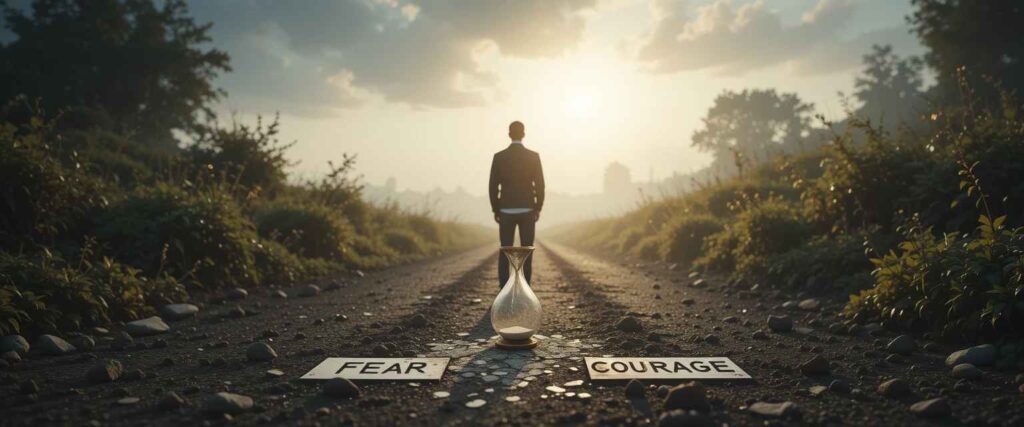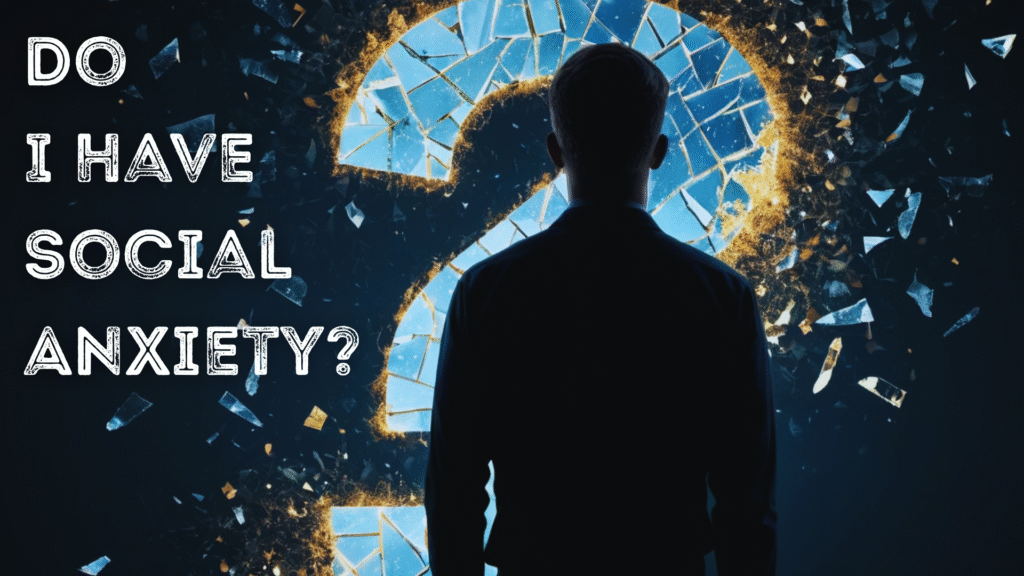Introduction: If You’re Asking “Do You Have Social Anxiety?”—Let’s Talk
Imagine this: You’re about to walk into a room full of people, and your chest tightens. Your palms sweat. Your brain screams, “What if they think I’m boring? What if I blush or say something dumb?” You force a smile, but inside, you’re counting the minutes until you can leave. Sound like you?
Social anxiety isn’t just “nerves.” It’s a crushing fear of judgment that makes everyday moments—like speaking up in class, dating, or even eating in public—feel like walking onstage naked. If you’re wondering, “Do I have social anxiety?” you’re not overreacting. Let’s cut through the confusion and explore 5 raw, real signs you might relate to—plus exactly how to start feeling better. No sugarcoating, no pressure. Just clarity.
1. “My Brain Won’t Let Go of Past Conversations”

What It Feels Like:
- You replay interactions like a broken record: “Why did I say that? They must think I’m so awkward.”
- You fixate on tiny “mistakes”: a pause in conversation, a joke that didn’t land, or how you held your coffee cup.
- You lie awake at night cringing over something you said weeks ago.
Why It Happens:
Social anxiety tricks your brain into treating social slip-ups like life-or-death failures. Think of it like a hyperactive smoke alarm—it blares “DANGER!” even when there’s no fire. This overthinking isn’t “dramatic”—it’s your mind trying (and failing) to protect you from imaginary judgment.
Science Simplified:
Studies show people with social anxiety have heightened activity in the amygdala (the brain’s fear center) during social interactions. Translation: Your brain’s alarm system is stuck on “high alert.”
What Helps:
- Write It Down: Grab a journal and answer: “What’s the worst that could happen? How likely is that REALLY?” Seeing your fears on paper often shrinks them.
- Talk to a Trusted Friend: Share one overthought moment. You’ll likely hear, “I didn’t even notice!”
2. “My Body Betrays Me in Social Situations”

Physical Signs You Might Recognize:
- Shaky hands, sweating, or a racing heart—even during casual chats.
- Nausea or dizziness before events (like parties or work meetings).
- Mind going blank mid-conversation, even if you’re talking about something you know well.
Why It’s Not “Just in Your Head”:
When anxiety hits, your body releases adrenaline—the same hormone that kicks in if you’re being chased by a bear. Your muscles tense, your heart pumps faster, and your brain prioritizes “escape” over rational thought. This isn’t weakness; it’s biology.
Real-Life Story:
Emma, 29, almost quit her job because presentations made her vomit beforehand. “I’d hide in the bathroom, shaking. I felt so ashamed,” she said.
What Helps:
- Belly Breathing: Place a hand on your stomach. Breathe in for 4 seconds (feel your belly rise), hold for 4, exhale for 6. Repeat until your heart rate slows.
- Cold Water Trick: Splash your face with cold water or hold an ice cube. This triggers your “dive reflex,” calming your nervous system.
3. “I Avoid Things I Actually Want to Do”

Avoidance Habits That Hurt:
- Skipping your best friend’s wedding because you’re scared of being “watched.”
- Staying quiet in meetings, even when you have great ideas.
- Ordering groceries online to avoid talking to cashiers.
Why Avoidance Backfires:
Avoidance gives temporary relief but teaches your brain: “That situation IS dangerous.” Over time, your world shrinks. You might miss promotions, friendships, or joy—all to stay “safe.”
The Hidden Cost:
- Career Impact: 20% of people with social anxiety turn down jobs requiring teamwork or public speaking.
- Relationships: Avoiding dates or family gatherings can lead to loneliness.
What Helps:
- Baby Steps: Too scared to go to a party? Start with a 15-minute video call with one friend.
- Reward Effort, Not Results: Did you RSVP “yes” to an event (even if you didn’t go)? Celebrate the courage it took to try.
4. “I Compare Myself to Others… and Always Lose”

The Comparison Trap Looks Like:
- Scrolling Instagram and thinking, “Everyone else is so confident. What’s wrong with me?”
- Assuming strangers in a café are judging your outfit, posture, or laugh.
- Feeling like you’re the only one struggling, even in supportive groups.
Truth Bomb:
Most people are too busy worrying about themselves to notice your “flaws.” That coworker who seems “perfectly confident”? They might be rehearsing conversations in their head too.
Science Says:
A 2023 study found that 70% of socially anxious people believe others notice their anxiety more than they actually do. Spoiler: They don’t.
What Helps:
- Delete Toxic Accounts: Unfollow influencers who make you feel “less than.” Follow mental health advocates instead (try @thelaminimalist or @nedratawwab).
- Practice “Reverse Comparison”: Next time you’re in a crowd, look for others who seem nervous—a person fidgeting, someone avoiding eye contact. You’ll realize you’re not alone.
5. “This Has Been My Normal for Months (Or Years)”

When It’s More Than “Just a Phase”:
- You’ve felt this way for 6+ months.
- Anxiety disrupts your job, school, or relationships.
- You feel stuck, even though you want to change.
Why Timing Matters:
Everyone feels shy sometimes. But social anxiety becomes a disorder when it’s relentless and life-limiting. The longer it goes untreated, the harder it feels to break free.
Real-Life Story:
Jake, 34, missed his daughter’s school play because he feared being “watched.” “I hated myself for it. But I couldn’t make myself go,” he shared.
What Helps:
- Therapy That Works: CBT (Cognitive Behavioral Therapy) helps 75% of people reduce symptoms by challenging negative thoughts.
- Free Resources: Try free apps like MindShift CBT or podcasts like The Anxiety Coaches.
“Do You Have Social Anxiety?” Here’s Your Action Plan
Step 1: Name It Without Shame
Write down: “I’m struggling with social anxiety, and that’s okay.” Shame thrives in silence—acknowledging it robs it of power.
Step 2: Start Small
- Fear Ladder Example:
- Smile at a stranger.
- Ask a store clerk, “How’s your day?”
- Join a small group hobby (e.g., a book club).
- Give a 5-minute presentation to a friend.
Step 3: Find Your Tribe
- Online Communities: Reddit’s r/socialanxiety or Anxiety and Depression Association of America (ADAA) forums.
- Local Groups: Search “social anxiety support group near me” on Meetup.com.
Step 4: Be Your Own Best Friend
Replace self-criticism with:
- “I’m learning. It’s okay to feel scared.”
- “Progress is messy. I’m still proud of myself.”
Read More:
- 7 Effective Ways to Overcome Social Anxiety at Work (Practical Tips for Confidence)
- The Root Cause of Social Anxiety: Why Your Brain Thinks Everyone’s Judging You
FAQ: Your Biggest Questions Answered
1. “Can social anxiety be cured?”
While there’s no “cure,” many people manage it so well it stops controlling their lives. Think of it like learning to drive—it gets easier with practice.
2. “What if I can’t afford therapy?”
- Free Workbooks: Download “Managing Social Anxiety” from ADAA.
- YouTube Therapists: Channels like Therapy in a Nutshell offer free CBT tools.
3. “Will medication help?”
For some, yes—SSRIs (antidepressants) can reduce physical symptoms. Talk to a doctor to weigh pros/cons.
- “Is social anxiety the same as generalized anxiety?”
No. Generalized anxiety involves constant worry about many things (health, money, etc.). Social anxiety is specifically fear of judgment in social situations. - “Can social anxiety start later in life?”
Yes. While it often begins in teens, major life changes (like a new job, divorce, or trauma) can trigger social anxiety in adulthood. - “How does social anxiety affect relationships?”
It can make dating, friendships, or family bonds feel exhausting. You might avoid intimacy, struggle to communicate needs, or fear conflict. Therapy or couples counseling can help bridge gaps. - “Are there medications that help social anxiety?”
SSRIs (like sertraline) or beta-blockers (for physical symptoms) are commonly prescribed. Always consult a doctor—they’ll weigh benefits vs. side effects for your case. - “Can alcohol or caffeine make social anxiety worse?”
Alcohol: Might ease anxiety short-term but worsens it long-term (it disrupts brain chemistry).
Caffeine: Can spike heart rate and mimic panic symptoms. Try herbal tea or decaf if you’re sensitive. - “Is social anxiety linked to autism or ADHD?”
While they’re separate conditions, some symptoms overlap (e.g., social awkwardness). A mental health professional can help differentiate and create a tailored plan. - “Do kids get social anxiety, or is it just adults?”
Kids can develop it too. Signs include refusing school, avoiding playdates, or extreme shyness. Early intervention (play therapy, parenting strategies) helps. - “Can exercise or diet reduce social anxiety?”
Exercise: Releases mood-boosting endorphins. Even a 20-minute walk can calm nerves.
Diet: Omega-3s (fish, walnuts) and magnesium (spinach, almonds) support brain health. Avoid sugar crashes—they mimic anxiety symptoms. - “What’s ‘high-functioning’ social anxiety?”
It means you appear confident outwardly (e.g., hold a job, socialize) but internally battle intense fear. Many people mask symptoms to “fit in,” which can lead to burnout. - “Can social anxiety cause depression?”
Yes. Chronic isolation and self-criticism can spiral into depression. Treating social anxiety often improves overall mental health. - “How do I explain social anxiety to someone who doesn’t get it?”
Use relatable metaphors: “It’s like my brain has a fire alarm that goes off during normal conversations.” Share articles or videos to help them understand.
Final Note: You’re Stronger Than You Think
Asking “Do I have social anxiety?” takes guts. This isn’t a life sentence—it’s a starting point. Maybe today, your win is reading this article. Maybe it’s texting a friend, “Hey, I’ve been feeling really anxious lately.” Every tiny step counts.
You don’t have to become the loudest person in the room. You just deserve to feel safe in your own skin.

AMAZING
Pingback: Can Social Anxiety Be Cured Without Medication? |6 Tips Anxieto
Pingback: Social Anxiety vs. Depression: 7 Key Differences Between Social Anxiety and Depression
Pingback: My Battle with Social Anxiety: How I Found Confidence & Peace | Personal Journey | Anxieto